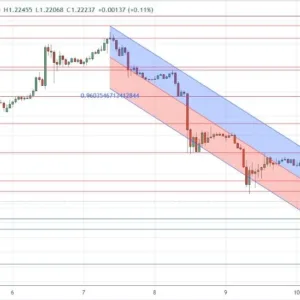By Huzefa Hamid
Bạn đang xem: Forex Trader Salary in the UK
Reviewer Adam Lemon
Fact-checker DailyForex.com Team
Are you in the UK looking to earn money in Forex? Well, I believe the UK is the best spot for Forex trading. Why? It is one of the world’s Forex capitals, with an active Forex industry offering many jobs, and the UK’s time zone is ideal for capturing trading opportunities in the most liquid Forex sessions.
Let’s look at how much Forex traders can earn in the UK and the skills they need.
It is critically important that every Forex trader attain a few foundational trading skills before entering the Forex market. These essential skills include:
- Understanding how Forex works
- Knowing how to control risk
- Having a disciplined psychology
Xem thêm : Will the Dam Break? (Video)
This must include:
- How Forex pairs work: Forex is unique to other markets, such as stocks/equities, because it trades in pairs. Know how the pairs work, for example, major vs. crosses, and that buying the base currency means selling the counter currency. For instance, buying GBPUSD means buying British Pounds and selling US Dollars against them.
- Spreads and order types: Know what bid/offer means, how to measure the spread, and order types (buy-limit, sell-stops, etc.), as well as more complex orders such as one-cancels-the-other (OCO).
- Session times: Even though Forex is a 24-hour market, specific times of the day are more liquid than others. The highest volume traded in Forex is during the New York Open (approximately 1-3 p.m. UK time), followed by the London Open (approximately 8-10 a.m. UK time). Trading during liquid times is particularly important for short-term traders.
- Economic calendar: Macroeconomic data, such as GDP, inflation, and employment levels, drive Forex price movements and trends. Forex traders must know where to find an economic calendar and which economic data has the most impact.
- Leverage: Currency prices move very little in percentage terms. Yet, leverage allows traders to make healthy profits from these moves. Know your available leverage and understand how leverage affects the profit or loss made on a trade.
- Position sizes and margin: Forex trades in “lots.” For example, one standard lot is 100,000 units of the base currency. If I buy one standard lot of USDJPY, I’m buying $100,000 and selling Japanese Yen against it. Know how to calculate the position size and margin (the deposit the broker requires in the account to cover a trade).
- Different currency instruments: In the UK, there are many ways to trade Forex. These include spot Forex, currency futures, CFDs, options, and spread betting. Some are more suitable for retail trading, e.g., spread betting, and some are better for non-retail trading, e.g., spot Forex and futures contracts. Learn their pros and cons to decide which is the best fit for your trading style.
- Support/resistance and trends: These two concepts are crucial in price moves. If these are new topics for you, practice drawing support and resistance lines and seeing trends on a charting platform such as MetaTrader 4 or MetaTrader 5 . For example, knowing the market is in a higher timeframe uptrend would make me more cautious to take a short position.
- Trading method: This can take a long time to develop, and it is a lot easier with a mentor. Trading requires a strategy that gives rules or guidelines for when to enter a trade, where to place a stop-loss, and where the profit target should be.
Profits only appear when traders control their exposure. There are three key ways in which you can manage risk:
- Always operate with a stop-loss. This is the exit point if the trade goes against me.
- Take trades with high reward/risk ratios. Successful traders worry less about the number of trades they win vs. lose but focus more on taking trades with higher profit potential than the loss. For example, if the stop-loss is 50 pips, I only take trades which offer 50 pips or more in profit target.
- Have a maximum risk per trade for the account size. For example, if I say I do not want to risk more than 2% per trade on the account, for a $10,000 account, the maximum loss on the trade cannot be more than $200, and I must control the position size of the trade accordingly.
Nothing matters without the discipline and the psychological mindset to handle risk. Trading real money is emotional, and being employed to trade can create extra pressure. In the heat of the moment, it’s tempting to let losses run in the hope the trade will turn around, add to losing positions, or take profits too early because of fear of losing it. The most effective foundation I’ve found for developing a strong mental framework is to journal trades—I record why I took a trade, whether the trade met the rules for the strategy, and what I could have done better.
The main options that I will cover are:
- Employed Forex trader. As the title suggests, a company employs you to trade Forex on their behalf.
- Traditional prop firm. A traditional prop firm allows you to trade their capital from a physical office space or trading floor.
- Modern prop firm. A modern prop firm allows you to trade their capital remotely from anywhere.
Investment banks and hedge funds employ Forex traders. They may trade with external capital (i.e., client money) or internal capital (e.g., the company founders’ money).
They hire analysts (for example, economic or technical analysts) and traders who manage capital. These roles often require specific skills, such as previous experience trading for banks, quantitative or statistical analysis skills, or qualifications such as BS, MS, or Ph.D. in Finance, Economics, Engineering, or related fields. Many individuals start in admin or programming roles in investment banks or hedge funds and find opportunities to become traders within the same firm.
These range from £50,000 for junior positions to over £100,000 for experienced traders. For example, I saw a LinkedIn job posting for a quantitative trader with 5+ years experience in a similar role and proficiency in SQL and Python—the salary range was £100-120k. Payscale and Indeed give up-to-date data on average trader salaries.
- A salaried position provides income security.
- Institutions are fantastic places to grow because they hire top talent, and you can work alongside them and learn the best in the industry.
- They often require long work hours. This can stop people from having time to develop their trading outside the job.
- Earnings potential may not match what you could make trading for yourself.
With a top UK broker, a proficient Forex trader can average 2-3% monthly returns and 5-10% monthly at the high end. For a £10,000 account, a 2-3% monthly return is £200-300 per month in profit, and 5-10% means £500-1000 monthly.
Few traders can break these percentage ranges, but it is possible. Remember, most traders lose money. I recommend never giving up other sources of income to trade until you prove to yourself that you can make money.
- I can keep working and have other sources of income while I build up my Forex trading income.
- As a profitable Forex trader, I can apply these skills for a prop firm account.
- The potential earnings are unlimited.
- Successful Forex trading with my capital gives me a lot of flexibility to choose the days and hours to trade.
- I can use Forex trading as a source of income while pursuing other career aspirations. One of the most successful traders I know spends half his year playing music with his band, but he does not have to worry about how much income the music business makes for him.
- There is no guarantee of making an income.
- There is no support when things are difficult.
- I need great self-discipline because I am not accountable to anyone. An external employer would ensure I spend a minimum amount of time each week trading and follow the rules, such as risk limits.
Xem thêm : Vantage Markets Wins “Best Range of Markets” Award from Compare Forex Brokers 2025
Traditional prop firms with physical locations paying salaries still exist, but I estimate no more than a few dozen exist in the UK. Many prop firms have migrated to online models offering to trade capital.
- LinkedIn is a great place to start. Entering keywords such as “Forex trader” in LinkedIn’s jobs section will bring up dozens of firms and recruiters looking to fill roles. LinkedIn allows users to filter for UK roles.
- Many UK-based recruiters specialize in finance, banking, and the markets. An online search will give a list of recruiting firms. Working with a recruiter will help develop your CV and provide an idea about the types of positions your experience and qualifications meet and the potential salaries.
- Writing to firms directly is a good idea. Explaining to a firm why they should hire you can open doors, for example, explaining you have a profitable track record as a trader.
- If you have a personal connection through a work colleague, friend or family to a firm that hires traders —use that connection to get an introduction.
Earnings Potential
Junior roles, such as administrative roles, start at around £50,000. Roles requiring more skills or experience, such as quantitative analysis, can pay more than £100,000. Proprietary trading jobs, where the company gives capital to trade, generally have low base salaries but huge bonuses depending on the profits generated.
- Traditional prop firms contain some of the best traders on the planet, making them an incredible environment in which to thrive, be accountable, and learn.
- They can have unlimited payouts for profitable traders.
- Many traditional prop firms pay base salaries.
- There’s lots of support and feedback, essential when market conditions are harsh.
- They can offer the flexibility to trade your way but with the support of a larger team—the best of both worlds.
- Few traditional prop firms remain, and a large number of applicants is chasing a small number of positions.
- They require you to be present in physical locations.
Modern prop firms have sprung up worldwide over the last decade, making the environment competitive and providing traders with many choices. This extensive choice has led to the following:
- Lots more firms with honest reputations.
- Traders can choose a prop firm that fits their trading style, such as supporting the instruments they prefer to trade.
- Prop firms give higher percentages of the profits back to the traders than in previous years, sometimes up to 90%.
I’ve noticed that prop firms have relaxed some of their more restrictive rules over the years. For example, many prop firms now allow overnight positions and a larger range of trading instruments.
Overall, I feel that the rules are realistic. The prop firms that have been in business for many years want their traders to succeed, and place rules that help ensure long-term success, such as controlling the maximum loss a trader can incur in a day.
Similar to trading for yourself, the earnings potential for trading with a prop firm is unlimited. Overall, prop firms are giving out larger percentage payouts to trading than in previous years, which has increased the earnings potential.
A prop firm multiplies the amount a trader can make because of the extra capital they can access. For example, someone trading with a £100,000 prop firm account would make ten times more than trading a £10,000 personal account (assuming the same trades and percentage risk).
- There are lots of reputable prop firms that have a history of paying out traders.
- Prop firms have relaxed their more restrictive rules, such as not allowing overnight positions.
- The percentage of profits that traders can receive from prop firms can be as high as 90%.
- The risk rules prop firms have in place increase the chance of success rather than traders relying on self-discipline to maintain the risk controls.
- Some prop firms offer mentoring to create a similar environment to traditional prop firms.
- Prop firms charge a fee for the evaluation period before giving capital.
- Not all prop firms operate honestly, with some having a reputation for not paying out profits.
- May prop firms operate in jurisdictions without any regulations.
- Prop firms often make you use a broker of their choice.
The UK is a fantastic location to trade Forex because it is one of the world’s financial capitals, with many Forex firms offering job opportunities. The UK’s time zone also captures the most liquid Forex sessions during the working day. Investment banks, hedge funds, traditional prop firms, and other institutions still offer trading-related positions in the UK. The positions can be analyst roles, administrative jobs, or trading positions with discretionary capital to trade, and sources like Payscale and Indeed can provide up-to-date average trader salaries. Of course, traders can opt to trade personal capital or join a modern (remote) prop firm—both offer unlimited earnings for profitable traders but do not offer a salary or job security.
Nguồn: https://cumlaude.fun
Danh mục: News






